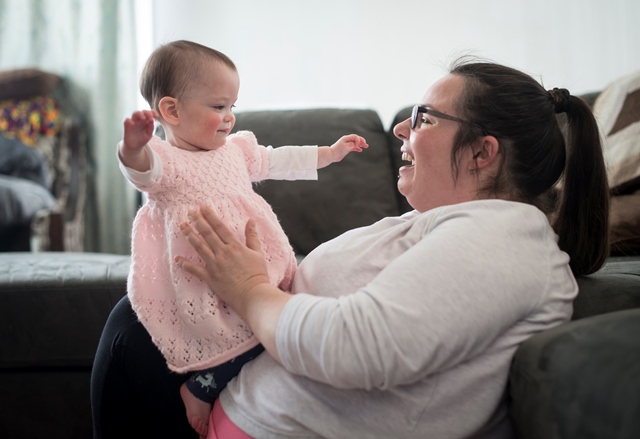By Marie Sanderson
A new approach to caring for sick and premature babies is supporting families as they transition from the hospital to home.
Building Opportunities for Optimal and Smooth Transition, or BOOST, is the only program of its kind in Canada. Babies in the program have a range of gestational ages; the one thing families have in common is they have had a prolonged stay in the NICU and could benefit from support as they transition to home.
For Afarin Salehi and Daphne Schibler, the approach to care is something both mothers continue to be grateful for.
“We had a bumpy start our daughter Lily,” says Afarin. “Lily spent time in two NICUs. We were struggling with multiple illnesses and dealing with so many doctors. Having a small physician team caring for Lily was invaluable and really eased our worries.”
Daphne can relate to the stress of having a premature baby. Her daughter Violet was born at 24 weeks, weighing under one pound, and spent 133 days in Sunnybrook’s NICU. Daphne recalls the anxiety and long days spent in the NICU. She says the consistency in the care team boosted communication about her baby and improved her confidence in caring for Violet.
Babies in the program have a full spectrum of health needs. Families participating in BOOST see the same doctor for very long stretches. There are only three physicians involved in the program, which allows for frequent contact with not only each other, but also each family, in turn easing families’ stress.
“We’re really thinking, every step along the way, about not only what is happening with the baby in the unit, but what’s down the road as we approach discharge and the baby going home,” adds Dr. Paige Church, neonatologist and developmental paediatrician and one of the team of core physicians, which also includes Dr. Elizabeth Asztalos and Dr. Rudaina Banihani. “Our biggest goal is to build capacity, and if possible resiliency, in parents, and shift to them being the primary caretakers once their baby leaves the unit.”
The approach clearly worked for both mothers, who beam when talking about their daughters. Violet is currently 14 months corrected age (a premature baby’s chronological age minus the number of weeks or months she was born early). “She’s a busy girl from when she wakes up to when she goes to sleep. She’s walking and is very good a destroying our house on a daily basis,” laughs Daphne. “She just started gymnastics to get her energy out.”
Lily is now 18 months corrected birth, and is not only walking but running, loves dancing and speaking.
“Lily’s future once seemed so scary and unknown, but now it is much more hopeful as the same physicians who know Lily very well are following up on her development,” says Afarin. “It’s very reassuring to know we are not alone in this long journey.”
Marie Sanderson works in Communications and Stakeholder Relations at Sunnybrook Health Sciences Centre.


